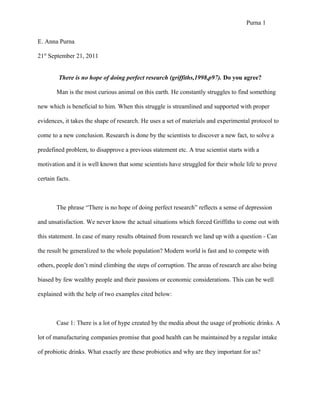There is no hope of doing perfect research_MLA
- 1. Purna 1 E. Anna Purna 21st September 21, 2011 There is no hope of doing perfect research (griffiths,1998,p97). Do you agree? Man is the most curious animal on this earth. He constantly struggles to find something new which is beneficial to him. When this struggle is streamlined and supported with proper evidences, it takes the shape of research. He uses a set of materials and experimental protocol to come to a new conclusion. Research is done by the scientists to discover a new fact, to solve a predefined problem, to disapprove a previous statement etc. A true scientist starts with a motivation and it is well known that some scientists have struggled for their whole life to prove certain facts. The phrase “There is no hope of doing perfect research” reflects a sense of depression and unsatisfaction. We never know the actual situations which forced Griffiths to come out with this statement. In case of many results obtained from research we land up with a question - Can the result be generalized to the whole population? Modern world is fast and to compete with others, people don’t mind climbing the steps of corruption. The areas of research are also being biased by few wealthy people and their passions or economic considerations. This can be well explained with the help of two examples cited below: Case 1: There is a lot of hype created by the media about the usage of probiotic drinks. A lot of manufacturing companies promise that good health can be maintained by a regular intake of probiotic drinks. What exactly are these probiotics and why are they important for us?
- 2. Purna 2 Probiotics are a set of live microorganisms which include Lactobacillus bacteria, bifidobacteria and some varieties of yeasts which are beneficial for the health of human beings. These probiotics have a capacity to alter the harmful microorganisms and improve the host microbial balance. These are particularly used in case of infants who suffer from acute diarrhea or in case of healthy children who suffer from acute gastroenteritis due to various reasons. Many companies which produce the infant formula or other food items claim that they have probiotics added to their product. Scientists are forced to prove and advertise that a daily consumption of these probiotics in the form of infant formula or yakult drinks is good for heath. This kind of biased research will promote these products. There is no clinical trial which supports that the regular use of probiotics is beneficial, although it appears that regular usage does not harm an individual (Academy of Pediatrics Reviews Use of Probiotics, Prebiotics). The pressure created by these companies will force a scientist to walk away from perfect research and produce manipulated results Case 2: We find a variety of fortified food items in the market being sold at very high prices. Prevalence of certain diseases like goiter, anemia, night blindness etc has been found to be endemic. The reason for this was traced to be the lack of certain vital micronutrients in local foods. For example, in some parts of the world, the soil is deprived of iodine. Hence, the crops grown in that area lack this nutrient. As a solution to this problem, science has come up with food fortification technology. During this process certain vital nutrients are added to food substances to complement the nutrient inadequacy. The market now is flushed with all kinds of fortified items which are sold at higher price e.g., fortified bread, fortified margarine, fortified wheat flour etc. This is increasing the consumption of processed foods which are not considered
- 3. Purna 3 to be good for heath. A proportion of scientific research is working in favor of these companies. Can we not find a cheaper alternative for this? Certain alternative measures or complementary forms of intervention can help to remove the nutritional inadequacy (FAO TECHNICAL CONSULTATION ON FOOD FORTIFICATION: TECHNOLOGY AND QUALITY CONTROL ROME, ITALY, 20-23 NOVEMBER 1995). As a part of these alternative measures people can be encouraged to develop home gardens. Kitchen gardening of green leafy vegetables can provide a cheap alternative to iron-rich foods and help reduce iron deficiency to a large extent. Research should be promoted to find cheaper alternatives to food fortification rather than promoting it as the only alternative to remove nutritional inadequacy. Apart from scientists working in the field of science few social scientists work in the real world laboratory and assess the impact of education systems, social media, nutritional status of pre school children etc. If the results of such research are skewed by economic considerations, the consumers of the research (Governments being one of them) could come to conclusions and policies which are not beneficial to society. A true scientist understands the pleasure in discovering something novel and seeing the society getting benefited out of it hence his prime focus should be to do good to the society rather than filling his pocket.
- 4. Purna 4 Works cited “Academy of Pediatrics Reviews Use of Probiotics, Prebiotics.” Medscape Medical News. Medscape. Medical News, 2 December. 2010. Web. 21 September. 2011. “FAO TECHNICAL CONSULTATION ON FOOD FORTIFICATION: TECHNOLOGY AND QUALITY CONTROL ROME, ITALY, 20-23 NOVEMBER 1995.” fao.org. fao.org, 20-23 November. 1995. Web. 21 September. 2011.




